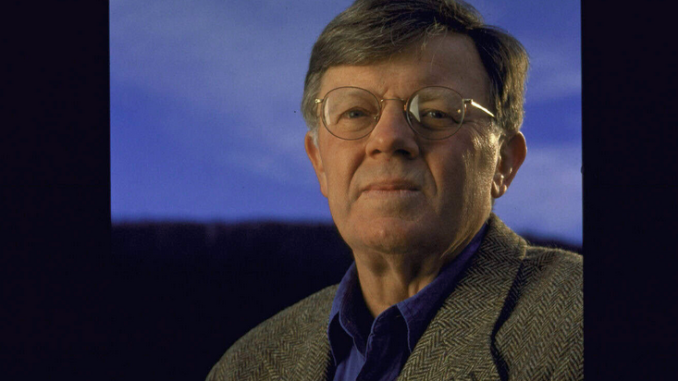The problem of anti-Israel bias has become much worse, in part because it has become an accepted part of mainstream journalistic culture.
Moshe Phillips
 Portrait of longtime writer for “TIME” magazine Lance Morrow. Photo by James Keyser/Getty Images.
Portrait of longtime writer for “TIME” magazine Lance Morrow. Photo by James Keyser/Getty Images.
Obituaries for journalist Lance Morrow, who passed on Nov. 29 at the age of 85, heaped praise on his “elegance” and “beautifully constructed” essays. They neglected to mention the antisemitic essay he once wrote—and the award it received from a prominent liberal Jewish organization.
Morrow was part of the wave of American journalists and columnists in the 1980s who specialized in accusing Israel of having lost its soul and betrayed its moral obligations. From his longtime, self-righteous perch at TIME magazine, he frequently lectured the Israelis on how awful they had become, how unlike the nice (but often dead) Jews of yesteryear.
“The People of the Book [have] become also a People of the Gun,” Morrow announced in TIME in October 1982. Israel had adopted “an aggressive and absolutist approach to life” guided by “brute logic.” Israeli Prime Minister Menachem Begin was “combative” and “strikes ugly notes” and makes “invidious” remarks about Israel’s enemies, Morrow wrote.
He continued with this poison dart: “The Jewish conscience is often a splendid moral instrument, one of the most highly developed in the world,” but—of course, there was a “but”—it had “plunged abruptly into mortal fallibility” in that year’s Lebanon war.
This was an ongoing theme in Morrow’s writings about Israel: the Jew Who Has Fallen Into Sin. Morrow’s antisemitic libels echoed some of the darkest periods of Jewish history.
In April 1989, Morrow authored a TIME cover story on “Israel at 40.” Morrow was a peculiar choice for the task since before becoming a senior writer at TIME, he had mainly been a theater critic. Among his recent topics were the continuing popularity of kissing, the meaning of summer and a profile of Mary Tyler Moore.
Bertram (“Benyamin”) Korn of the Committee on Accuracy in Middle East Reporting in America was the only Jewish leader to challenge Morrow’s “Israel at 40” article. Korn pointed out that the essay was “filled with inaccuracies from beginning to end,” including:
• Morrow depicted the 1967 war as Israeli aggression. No mention of Arab threats or mobilization of Arab armies, just “Israeli armies sweeping over Gaza and the Sinai to the south, the entire West Bank of the Jordan and the Golan Heights in the north.”
• Morrow drew false moral equivalence between Arab terrorism and Israeli self-defense. He listed some Arab attacks and then added: “But now the Israelis have shown a ferocity of their own.”
• Morrow described Israel’s leaders as “craven,” “weak,” “cowardly” and “dispiritingly small—visionless and timid, working the world from a defensive crouch.” The worst thing he wrote about the PLO leader Yasser Arafat, a mass murderer, was that he lacked “a larger sense of the constructive.”
And, of course, Morrow’s essay invoked his favorite theme: The Fallen Jew. According to Morrow, “the Zionist dream cracked when it fell to earth” and Israel’s handling of Arab rioters “undermines the moral edifice of the Chosen.”
Incredibly, this tirade was the essay for which the left-of-center New Israel Fund gave Morrow its “Ted Lurie Memorial Award for Outstanding Reporting About Israel” that year.
When Korn criticized the selection, New Israel Fund president David Arnow responded with a statement that did not address the anti-Israel and anti-Jewish statements in Morrow’s article. Instead, Arnow merely listed the credentials of the “distinguished media professionals” who served on the panel of judges.
Korn responded: “Those ladies and gentlemen may indeed be ‘distinguished,’ but that hardly means that their choice of Morrow as the award’s recipient was wise. … Is it perhaps precisely because the judges are—in Arnow’s words—‘media professionals’? Bias against Israel is so prevalent among American media professionals these days that one can hardly expect them to be impartial.”
Indeed, among the journalists who received the New Israel Fund’s award prior to Morrow were two other extreme critics of Israel: Thomas L. Friedman of The New York Times and Dan Fisher of The Los Angeles Times. A pattern is easy to detect.
In the years since then, the problem of anti-Israel bias has become much worse, in part because it has become an accepted part of mainstream journalistic culture. The unfortunate decision by a left-wing Jewish organization to reward one of the ugliest examples of that bias only compounded the problem.
Moshe Phillips is national chairman of Americans For A Safe Israel (www.AFSI.org), a leading pro-Israel advocacy and education organization.]



Lance Morrow’s “Israel at 40” essay:
https://time.com/archive/6679912/israel-at-40-the-dream-confronts-palestinian-fury/